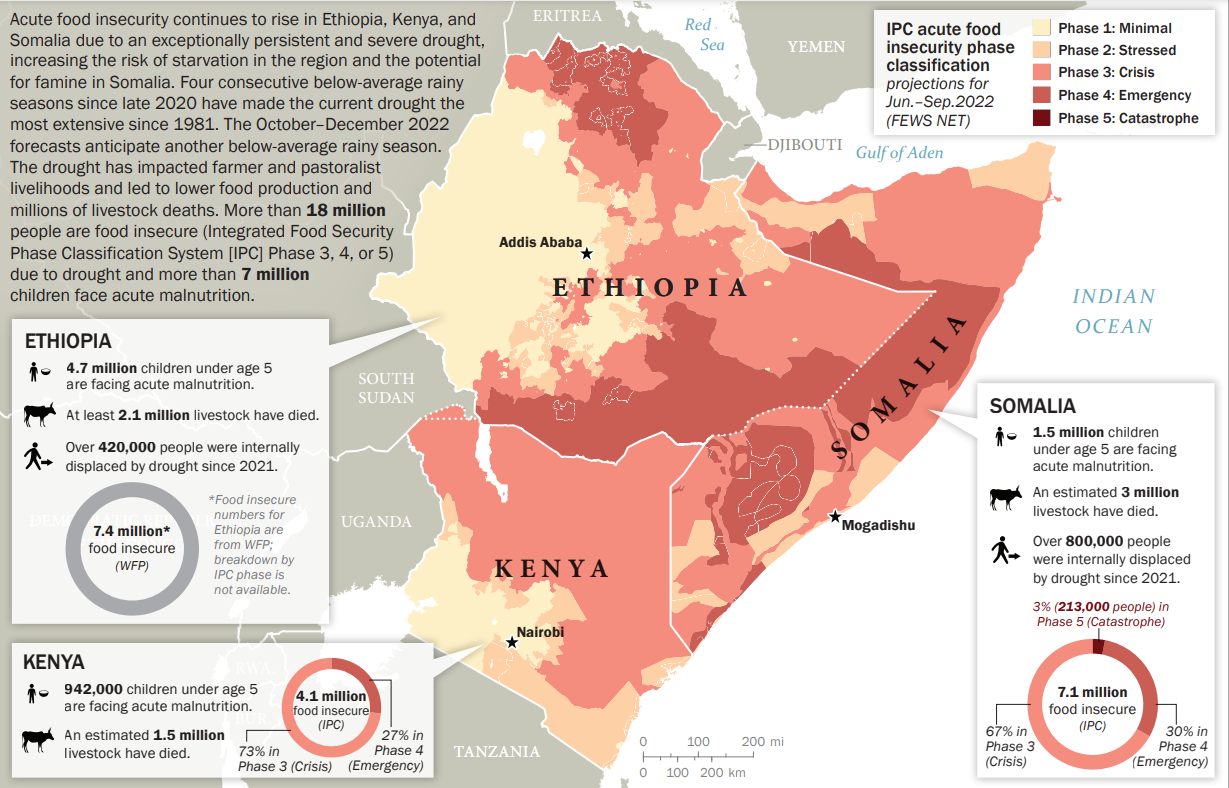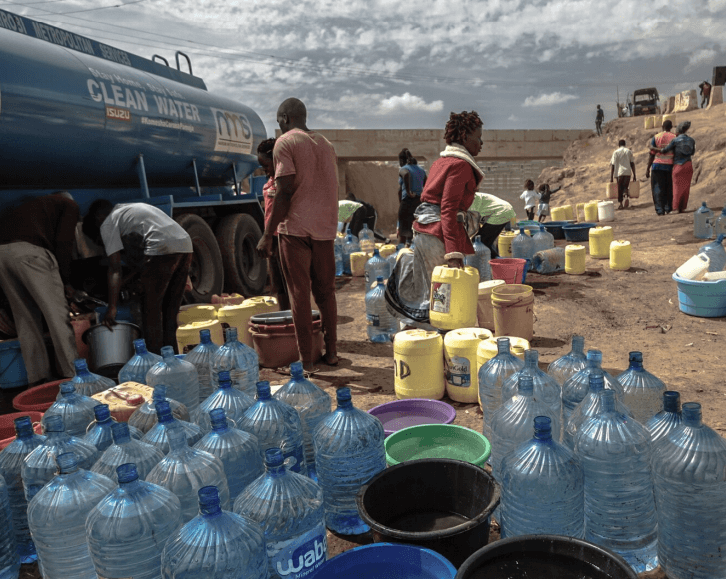Over half a million people were forced to flee their homes in Somalia in search of food and water in the first ten weeks of 2022, acres of once lush farmlands in Kenya have been reduced to shrubs, and Djibouti’s groundwater levels have nearly depleted due to rising temperatures. A similar situation in Ethiopia has forced tens of thousands of people to adopt extreme survival strategies like drinking dirty river water. These countries together form the Horn of Africa region, which is facing its worst drought in four decades. According to estimates, the region’s intense aridity will push nearly 20 million people towards starvation by the end of the year. In fact, over seven million Ethiopians are already waking up hungry, and 40% of Somalia’s population and three million Kenyans are facing chronic hunger levels.
To add to the region’s woes, this drought-induced catastrophe is being both sustained and exacerbated by the war in Ukraine. While the war has sent tremors across the globe, its impact on underdeveloped countries, especially in Africa, has been disastrous. In the Horn of Africa, the war has resulted in a food and fuel crisis and hampered regional states’ ability to import or produce food-related products, drastically worsening the region’s famine crisis.

Sanctions are making it difficult for Moscow to conduct trade and over 20 million tonnes of grain are stuck in silos at Ukrainian ports due to a Russian naval blockade. However, Somalia, Kenya, and Ethiopia respectively import 92%, 89%, and 67% of their wheat from the two countries, resulting in critical shortages of wheat-based food products like bread, which has in turn led to a spike in demand and a resulting price rise.
In fact, since Russia invaded Ukraine back in February, the cost of wheat in Somalia increased by 300% and food prices across Kenya jumped by an average of 70%. The region is heavily dependent on food imports to feed its population, since climate change-related issues have made crop cultivation extremely difficult. For example, Djibouti receives 90% of its entire food supply as imports. Therefore, the slightest variation in global agricultural prices is bound to negatively affect the region.
More than 90% of Somalia's wheat comes from Ukraine and Russia.
— CNN International PR (@cnnipr) July 7, 2022
Between record-breaking drought and Russia's invasion of Ukraine and blockade of its wheat, Somalia is on the brink of another famine.
CNN's @clarissaward reports from Mogadishu. pic.twitter.com/FyV1nPEvPz
A vast majority of the Horn’s population lives on less than $1-$2 per day and rising food prices have made it almost impossible for families to purchase even basic food items. Furthermore, since food accounts for almost 40% of the region’s household budget, millions of families will be forced into starvation.
Additionally, a rise in energy prices due to Russia being barred from trading in dollars, market fear of the destruction of energy pipelines in Europe, and a disruption in global energy supply chains as Europe seeks to reduce dependency on Russia have threatened to disrupt the Horn’s ability to produce food. The UN notes that the disruption to oil prices has led to higher costs of food production, which inevitably translates to rising food prices. Rising energy prices have also led to what the UN terms “energy poverty” in many sub-Saharan countries. The phenomenon refers to a family’s inability to access electricity and cooking fuels, without which families have no option to make their food, leaving them at the mercy of aid organisations.
🚨The Horn of Africa is facing its worst drought in 40 years.
— UNHCR, the UN Refugee Agency (@Refugees) July 11, 2022
UNHCR urgently needs funds to provide assistance to 1.5 million refugees, internally displaced people and local host communities in the region. pic.twitter.com/wlQn52ZF8p
However, the war has left a lot of aid organisations in a dilemma. As the humanitarian needs of Ukrainians increase every day, humanitarian groups are diverting funds meant for African countries to Ukraine. According to NGO ‘Save the Children,’ the outpouring of global support for Ukraine has unfortunately resulted in other crises being neglected. Denmark, for instance, announced that it would reroute funds meant for several African countries to address the crisis unfolding in Ukraine. The Horn of Africa region is particularly dependent on international aid. A case in point is the relief camps set up by the UN and other aid agencies in Ethiopia’s Tigray region to provide food, medicine, and shelter to displaced people. A shortfall in aid money would deprive millions access to basic necessities.
Simultaneously, a climate crisis has resulted in rising temperatures and changing weather patterns in the region. For instance, there has been below-average rainfall during the past three rainy seasons and it is expected that the region will face another drought this year as well.
Regional conflicts like the Ethiopian civil war are making matters worse. Ethiopian authorities have on numerous occasions prevented aid from reaching the war-torn Tigray region. An insurgency has continued to destabilise Somalia for decades and made it difficult for aid agencies to operate in the country.
🔴#Somalia: risk of famine in coming months
— World Food Programme (@WFP) April 19, 2022
🔴#Kenya: half a million people facing emergency levels of hunger
🔴#Ethiopia: 7.2 million people in drought-affected areas wake up hungry every day
Extended drought is fueling hunger across the Horn of Africa: https://t.co/pS9YRTJ7nV
The Ukraine war’s impact on Africa is a dark reminder that today’s conflicts are no longer just local or regional—they have global reverberations. The Russia-Ukraine war is fuelling multiple crises across the world, including Lebanon and Sri Lanka’s economic woes, and a decades-high inflation level in the United States. There is thus not only a moral responsibility to prevent conflicts like the Ukraine war but also an economic imperative, particularly in order to protect underdeveloped countries, who are disproportionately affected by such wars, from further misery.

